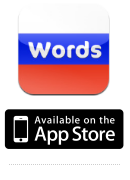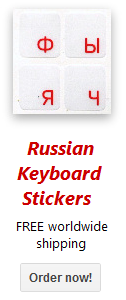 FR FR |
About us | Home | User agreement | Link to us |

Russian Lessons and Articles
Whether you're just beginning to learn Russian or trying to tackle more advanced topics, this page will help you to quickly find a lesson on
our website. The lessons below are organized by topic and answer a variety of questions about Russian grammar, vocabulary and language learning.
In addition to these lessons, MasterRussian has many other Russian
language resources available from the menu on the left!
Russian Nouns
Noun
Gender and Number
In this lesson you will learn about three genders, as well as plural
and singular forms of Russian nouns.
The
Declension of Singular Nouns
Learn how Russian nouns change by case and number.
The
Declension of Plural Nouns
There is no strict distinction between declensions of plural nouns in
Russian. This lesson reviews the endings for plural nouns in all six
cases and gives simple examples. There is short test with answers at
the end of the lesson to check your comprehension.
Russian Pronouns
Classes of
Russian Pronouns
A must have reference table that groups Russian personal pronouns into classes,
lists all pronouns for each class, and provides English equivalents.
The Negative Pronouns
Take a lesson on words used to talk about things and people which do not exist.
The Relative Pronouns
Take a lesson on words used to interconnect the parts of a compound sentence. They are widely used in everyday conversations, so you
might want to know them in advance.
The Indefinite Pronouns
A lesson on pronouns used to refer to indefinite or unknown things, people, features and quantities.
The Interrogative Pronouns
The interrogative pronouns are important, because they are used to ask questions. Take this lesson and you will learn how to ask about place, time,
quality, quantity and possession.
The
Possessive Pronouns
The possessive pronouns indicate that things belong to somebody or
something else. In Russian language, they are the words "мой",
"твой", "наш",
"ваш", "чей".
Take this introductory lesson and then put your comprehension to the
test.
The
Personal Pronouns
Pronouns are words that are used as substitutes for nouns. Here we
take a look at the personal pronouns. You well become fluent in such
Russian words as "ya", "mi", "ti",
"vi", "on", "ona", "ono" and
"oni".
The
Demonstrative Pronouns
Learn about
Russian demonstrative pronouns "тот"
(that), "этот" (this), "такой"
(such) and "столько"
(so), which are widely used to talk about quality and quantity of
objects.
The
Determinative Pronouns
Words like
''oneself'', ''all'' and ''every'' are called the determinative
pronouns. They refer to definite but not specific actions and features
of objects. This lesson shows how Russian determinative pronouns
change by gender, number and cases.
Cases in Russian
Usage
of Cases
In Russian, it is the case of a noun that shows what role the noun
plays in a sentence. The table below shows how the noun "Алексей" (a male
name) changes by cases.
The
Prepositional
Nouns
get the prepositional case when you use them to designate a place,
time, or an object of thought. This lesson
will teach you how to use and form the prepositional in Russian.
The Instrumental
It is easy to remember that the instrumental is used to describe the
instrument by which an action is performed. This lesson will teach you
how to use and form the instrumental case of Russian nouns.
The Accusative
The accusative is used to talk about a person or thing to whom or
which and action is being done. In this lesson you will learn
everything you will need to use the accusative of Russian nouns
correctly.
The Dative
The principal meaning of the dative case is "to" or
"for". It is used to show that something is given or
addressed to someone or something.
The Genitive
The principal meaning of the genitive case is "of". However
Russians do not use "of" in itself and put nouns into the
genitive instead. In this lesson you will learn how to use the
genitive of Russian nouns.
The Nominative
Lesson on the usage of the initial form of Russian nouns.
The Cases of Russian
Nouns at a Glance
The Russian "ear" is very sensitive to the endings of nouns.
In this lesson you will learn about the case of a noun. Cases show
what role nouns play in the sentence and set the rules of choosing
correct endings.
Russian Adjectives
Long
and Short Forms of Adjectives
Most Russian adjectives come in two forms: long and short. The long
form is what you normally find when you look up a word in a
dictionary. However, the short form of adjectives is quite common in
today's conversational Russian. Besides that, you will most likely
have to use the short form of an adjective in the end of a sentence.
This lesson teaches how to form and use the short form of adjectives.
Intro
to Adjectives
Adjectives are words that describe nouns or pronouns. All Russian
adjectives must agree with nouns in number, gender and case. This
lesson will give you an intro into the adjectives and teach some most
common adjective endings, so that you'll be able to compose simple
phrases.
Declension of Adjectives
Russian
adjectives agree with nouns in gender, number and case. The change of
adjectives depending on cases is called declension. This lesson shows
typical endings for singular and plural adjectives.
Russian Verbs
A Must
Have Table on Russian Verbs
A must have reference table that groups Russian personal pronouns into
classes, lists all pronouns for each class, and provides English
equivalents.
Subjunctive and Imperative Mood
A lesson on the mood of a Russian verb, an underlying concept of how
it changes in person, number or tense.
Conjugation of Verbs
Learn how Russian verbs change to agree with the person they are
referring to.
Future Tense
Learn Russian future tense verb forms.
Past Tense
Learn to talk about past actions and situations in Russian.
Present Tense
Learn how to use the Russian present tense.
Verb Person and Number
Learn how Russian verbs change by person and number.
Aspect of the Verb
Aspect is probably the most difficult thing about the Russian verb.
The Infinitive
Learn about the initial form of the Russian verb.
Russian Numbers
Ordinal
Numbers
Ordinal numbers designate order in counting. They answer the question
"which one?" For example, the phrases "the 5th day" and "the 8th word"
use ordinal numbers. Like in English, Russian ordinal numbers are
formed from cardinal numbers. However there are more endings you must
know when speaking Russian as opposed to the only one ending "-th" in
English.
Cardinal Numbers
Numerals (numbers) designate quantity or order in counting. They are
divided into ordinal, collective, fractional and cardinal numbers. This
lesson teaches the usage of Russian cardinal numbers that designate the
number of people or things, and answer the questions "how many" or "how
much?"
Learning Tips and Advice
How to Learn Russian
Hints on independent, quick, and firm learning.
Best Podcast for Learning Russian
Learning Russian can be easier than you think. Three modern language teaching methods from Mark Thomson.
How to Learn Russian: Pronunciation
Dealing with pronunciation and grammar.
How to Learn Russian: Listening and Reading
Developing your listening and reading skills.
How to Learn Russian: Speaking and Writing
The last article in a series focuses on speaking and writing skills.
Welcome to Russian!
Read what it is all about to learn a foreign language.
Sentence Structure
The Russian sentence structure is very flexible. In this lesson will
learn the general way to arrange a sentence in Russian, as well as how
the word order affects the meaning and the style of a sentence.
How to
Tell Time in Russian
The most difficult thing about telling time in Russian is to
decline hours and minutes. With this "how-to" you will learn
how to tell time in Russian in just 10 minutes.
Russian Vocabulary
Russian Speaking Vocabulary
Vocabulary lessons with audio that will help you to learn basic to
intermediate Russian vocabulary.
How To Say "No" In Russian
There is a Russian proverb that says "Хорошего
понемножку" which can
be translated to English as "It's too much of a good
thing". Even a good thing can become boring and one will have to say
"no" to it. Before it's too late, let's learn how to form negative
constructions in the Russian language.
Compliments and Praise
Whether it is the special Valentine's Day or any other day of the
year, you always have several ways to express your feelings through a
sincere compliment.
Vocabulary Exercise: Synonyms and
Antonyms
Take this intermediate level exercise to improve your Russian
vocabulary. The goal of the exercise is to think of words that are
opposite (antonyms) or similar (synonyms) in meaning to words given in
the the sentence. Answers provided to check your progress.
Beware False Friends
"False friends" a.k.a. "false cognates" are words that sound or look
similar to other foreign words but have different meaning. Here you
will find several false cognates with definitions and examples that
illustrate the difference.
"To Be" vs. "To Have"
Learn how possession is expressed in Russian.
Writing a Business Letter
Learn how to structure a business letter and what phrases to use to
make it look professional.
Describing People
Just make several choices to describe people in Russian with these
easy-to-use patterns.
What is a Synecdoche?
Sounds like a strange word? Learn what it means, and how to do it in
Russian.
Greeting People
It may seem unusual, but Russians tend to understand "How are
you?" literally.
Writing a Business Letter
Writing a good business letter in Russian can be easy. This guide
shows you how to structure a business letter and what phrases to use
to make it look professional.
Methods for Learning Russian Words
Memorizing new words have never been so quick and easy as it can be
now.
Methods for Learning Russian Words (2)
Three new methods to increase your Russian vocabulary.
How-To's
How To Tell Time In Russian
The most difficult thing about telling time in Russian is to decline
hours and minutes. With this "how-to" you will learn how to tell time in
Russian in just 10 minutes.
How to type Cyrillic letters in Win 95/98
Unless you have Russian version, Windows 95/98 needs some additional
set up to type Russian letters. Read these simple instructions to learn
how.
How
to View Pages in Russian in Windows 95/98
You can set up your Windows 95 or later to display proper Russian
letters when browsing Web-pages with Internet Explorer or Netscape
Navigator. Usually this requires installing additional Multilanguage
Support Module and telling your page viewer to use proper fonts.
Product Reviews
Product
Review - By Heart 1.71
Need a tool to build your Russian vocabulary and improve language
learning? Then this review will help you decide whether By Heart is right for you. Read on to learn more about the product features,
pros and cons, and how to download a trial version of the program.
Other Russian Lessons
Popular Russian Names For Boys
Russians have three
names: the first or given name, the surname or family name, and
patronymic. The following list includes 90 first names for boys most
widely used nowadays in Russia.
Popular
Russian Names For Girls
Find your favorite female Russian name in our list of 90 most widely
used first names for girls.
Contemporary
Russian Coins
The Russian monetary unit is a ruble, divided into 100 kopecks. There
are yellow and steel coins made of an alloy. This feature shows the
heads and tails for 1, 5, 10, 50 kopecks as well as 1, 2 and 5 rubles.
Got questions?
Ask them in the Russian Questions and Answers — a place for students, teachers and native Russian speakers to discuss Russian grammar, vocabulary, pronunciation, and other aspects of the Russian language.
Copyright 2001-2026 MasterRussian.com | Privacy Policy | Contact Us
 Russian Lessons
Russian Lessons
- Russian alphabet
- Names of letters
- Russian Q&A new
- Pronunciation: Cons.
- Pronunciation: Vowels
- Noun Gender/Number
- Cases of Nouns
- Russian Greetings
- Personal Pronouns
- Learning Russian
- 1000 Common Words
- 500 Russian Verbs
- Top Russian Nouns
- » All lessons
- » Guest lessons
 Browse Topics
Browse Topics
- Start learning Russian
- Forum
- Bookstore
- Dictionaries
- Russian - basic
- Russian - adv
- Pronunciation
- Russian Blog new
- Reading
- Test & quizzes
- Translation
- Verbs
- Verb Conjugations
- Russian numbers
- Russian Tests new
- Vocabulary
- Writing
- Folk music
- Fun stuff
- Leo Tolstoy
- Learner's lore
- Literature
- Personal blogs
- Picture Dictionary new
- Proverbs
- Publications
- Radio & TV
- Russian culture
- Schools in Russia
- Russian Words
- Russian names
- Software
- Russian Words iPhone
Clicks the "Like" button below to get daily updates on Facebook!
Click "Add to circles" to learn Russian on Google+

Search MasterRussian

English » Russian dictionary

WORD OF THE DAY
![]() RSS
|
iGoogle
|
My Yahoo!
RSS
|
iGoogle
|
My Yahoo!
Meaning: face, front, countenance
Pronunciation: [lee-TSOH]
Learn Russian words! »
TODAY'S STREET SIGN

Russian: Аптека
English: Drug store
FOLLOW US ON TWITTER

MasterRussian on Twitter


